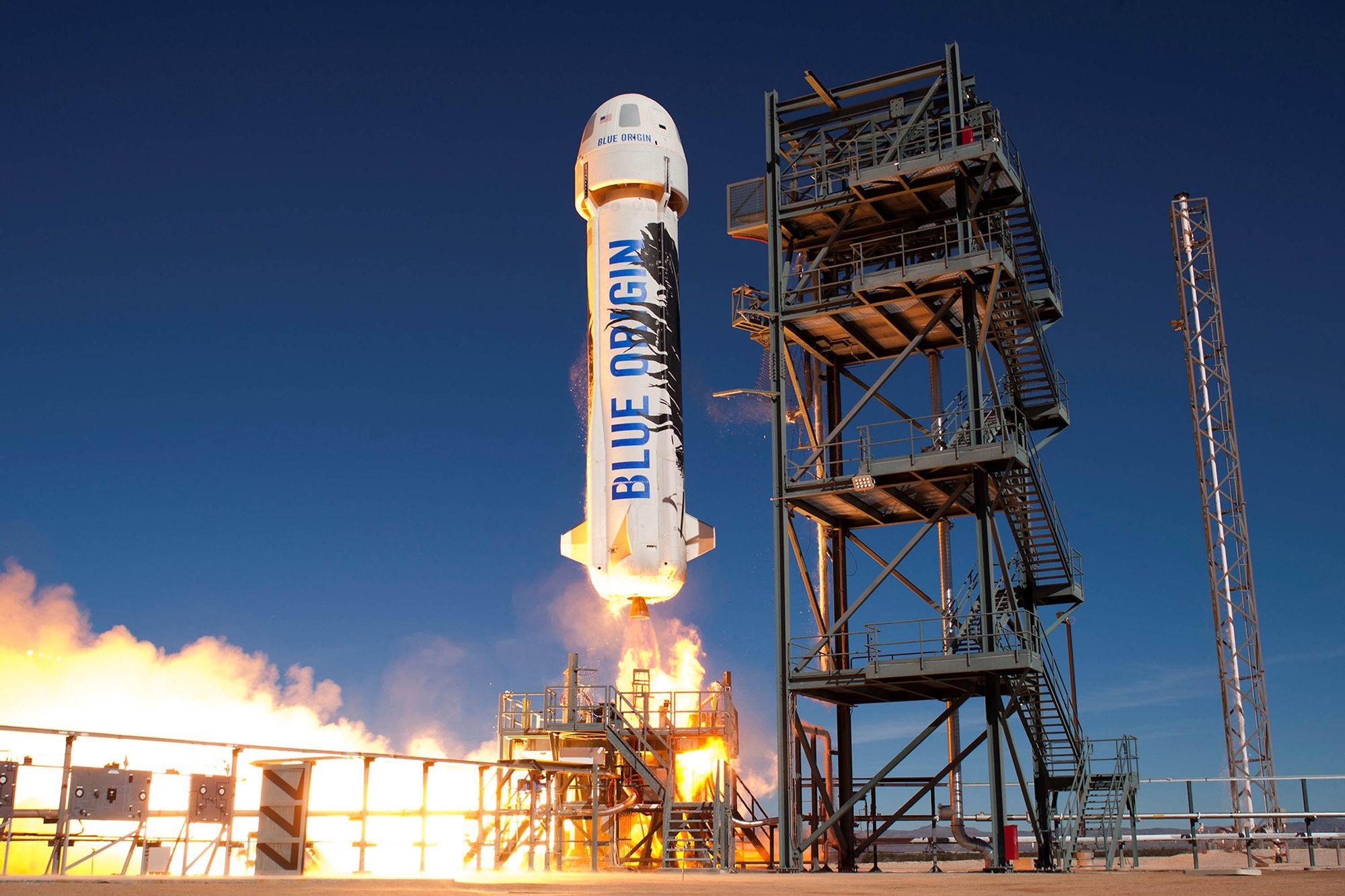On Feb. 2, Jeff Bezos announced he would step down as the CEO of Amazon and assume the role of executive chairman. In this feature (first posted in our Inside Amazon newsletter), writer Jigney Pathak analyzes what this means for the e-commerce giant, and how Bezos will likely spend his time moving forward.
In his farewell letter to Amazon employees, Bezos wrote, "As Exec Chair I will stay engaged in important Amazon initiatives but also have the time and energy I need to focus on the Day 1 Fund, the Bezos Earth Fund, Blue Origin, The Washington Post, and my other passions.”
Let's first take a look at a few of those projects:
Blue Origin is Jeff Bezos' personal space exploration company which aims to make space travel cheaper and more accessible.
- Bezos founded the company in 2000 and has called it the "most important work I’m doing."
- In 2017, he announced he would liquidate at least $1B of Amazon stock annually to fund Blue Origin. Reuters reported that Bezos will likely shift much of his attention to Blue Origin, which has fallen behind its competitors, including SpaceX, NASA's "go-to-ride into orbit" in the orbital transportation sector.
- Blue Origin is also competing with SpaceX and Dynetics to develop a lunar lander for NASA, aiming to take humans to the moon. Bezos reportedly believes winning and executing the contract would help the company become NASA's main partner and ensure its profitability.
- Last month, Blue Origin's New Shepard rocket booster and capsule completed its fourteenth test flight. New Shepard can reach altitudes of more than 340,000 feet and is built to carry passengers past the edge of space. The company could begin flying passengers into space as early as April.
- New Glenn is Blue Origin's reusable first-stage booster rocket designed to carry satellites into orbit. It was awarded a NASA Launch Services (NLS) II contract in December, allowing it to compete for space missions until December 2027.
- On Feb. 25, Blue Origin delayed the inaugural launch of New Glenn until Q4 2022 after it lost out on important government launch contracts worth billions of dollars to SpaceX and United Launch Alliance.

In 2020, Bezos started the Bezos Earth Fund for climate change, which he has called the "biggest threat to our planet." Bezos donated $10B (between 7-8% of his net worth) in award grants to scientists, climate activists, and non-government organizations. In November, the fund distributed $791M of grants to 16 different organizations. Bezos was named the top philanthropist of 2020, with the bulk of his donations coming from his Earth Fund.
In 2018, Bezos and his ex-wife Mackenzie Scott launched the $2B Day One fund, which focuses on homelessness and education. The fund awards grants to nonprofits combatting homelessness and finances the creation of preschools for low-income communities. It has distributed funding to 42 nonprofits in 24 states so far. The fund draws inspiration from Amazon's Day 1 mentality, which means treating each day as if it were the first day of a new startup.
Jeff Bezos purchased The Washington Post for $250M in 2013. Before his purchase, the Washington Post had experienced a 44% fall in operating revenue over the past six years. He has been credited with transforming the newspaper's digital operations, promoting it on Amazon devices such as the Kindle. Under his stewardship, the Washington Post has become profitable for five consecutive years (2016-2020) and now employs more than 1000 journalists. In 2019 he said, “My stewardship of The Post and my support of its mission, which will remain unswerving, is something I will be most proud of when I’m 90 and reviewing my life."
Bezos' ties to the Washington D.C. area extend beyond the Post, as recent reports suggest he is interested in purchasing the Washington Football Team.
What's next for Amazon's major services?
Amazon announced Andy Jassy, head of Amazon Web Services (AWS), will succeed Bezos as CEO. In Q4 2020, AWS generated $12.7B of revenue. Operating income rose by 37% YoY to $3.6B. AWS accounts for almost 60% of Amazon's pre-tax profit. In 2013, Bezos predicted AWS's revenue would surpass Amazon's e-commerce revenue. While this prediction has yet to come true, it highlights how critical AWS is to Amazon's plans.
Jassy's appointment sparked speculation that Amazon views cloud, not e-commerce, as its future. AWS is the largest player in the cloud industry, controlling 30% of the global market. Under Jassy's stewardship, it has become a $50B business, with more than one million customers such as Pfizer and Walt Disney.
While AWS is an important part of Amazon's business, e-commerce is still the tech giant's biggest revenue source. Amazon remains the dominant player in the U.S. e-commerce sector with a 40% market share. In Q4, Amazon's e-commerce sales grew by 44%, helping propel the tech giant to its first-ever $100B quarter. It earned a record $10B during its annual Prime Day back in October.
Amazon benefited greatly from the COVID-19 pandemic as total sales rose to $386.1B in 2020, a 38% increase from 2019, while net income came in at $21.3B, an 84% jump YoY. Amazon's share price surged by 76% last year.
Under Jassy, Amazon will likely continue to expand its e-commerce presence in important international markets such as India. The South Asian country only accounts for a small portion of Amazon's total revenue currently, but it could contribute up to 20% of the tech giant's growth over the next five years. Amazon is currently locked in a legal battle with Indian conglomerate Future Group over the sale of its retail assets to Reliance. In 2019, Amazon acquired a 49% stake in Future Group, which owns 7.3% of Future Retail. This gave Amazon a 3.58% stake in Future Retail.
Amazon has a $1.58T market cap, and there have been calls to break it up. The Federal Trade Commission is investigating Amazon's business practices, and last year the House Judiciary Committee's Antitrust Subcommittee said Amazon has monopoly power over third-party sellers. Currently, Amazon is facing its biggest unionization threat in the U.S. since 2014, as warehouse workers in Bessemer, Ala., could soon vote to form a union. The drive has drawn support from over 12 Senators, including Bernie Sanders and Elizabeth Warren.
Finally, let's take a look at what happened when other iconic CEOs stepped down:
Microsoft: In January 2000, Microsoft founder Bill Gates stepped down as CEO but stayed on as “chief software architect” until 2008. As he and his successor, Steve Ballmer, often clashed, Gates took a hands-off role in 2009. Gates left Microsoft's board in 2020 and currently serves as a technology advisor to CEO Satya Nadella. Under Nadella, Microsoft's share price has increased by an average of 37% in the past five years, making the tech giant the second most valuable company in the world.
Apple: In August 2011, Tim Cook replaced Apple co-founder Steve Jobs as CEO, a few months before Jobs' death. At the time, investors feared Apple would struggle without him, and the company has often been criticized for a lack of innovation over the last decade. However, under Cook, Apple's market cap has surged from $360B in 2011 to more than $2T.
Alphabet: In December 2019, the head of Google, Sundar Pichai, became the CEO of its parent company Alphabet, when co-founders Larry Page and Sergey Brin stepped down. In the past year, Alphabet has faced political scrutiny in the U.S., Australia, and Europe, but its share price has surged by 45%. Alphabet is currently the world's fourth most valuable company.
Jigney Pathak is a Business Researcher at Inside who loves technology, finance, and sports. He has a Bachelor of Business Administration with a finance specialization & has previously worked at Salesforce.




